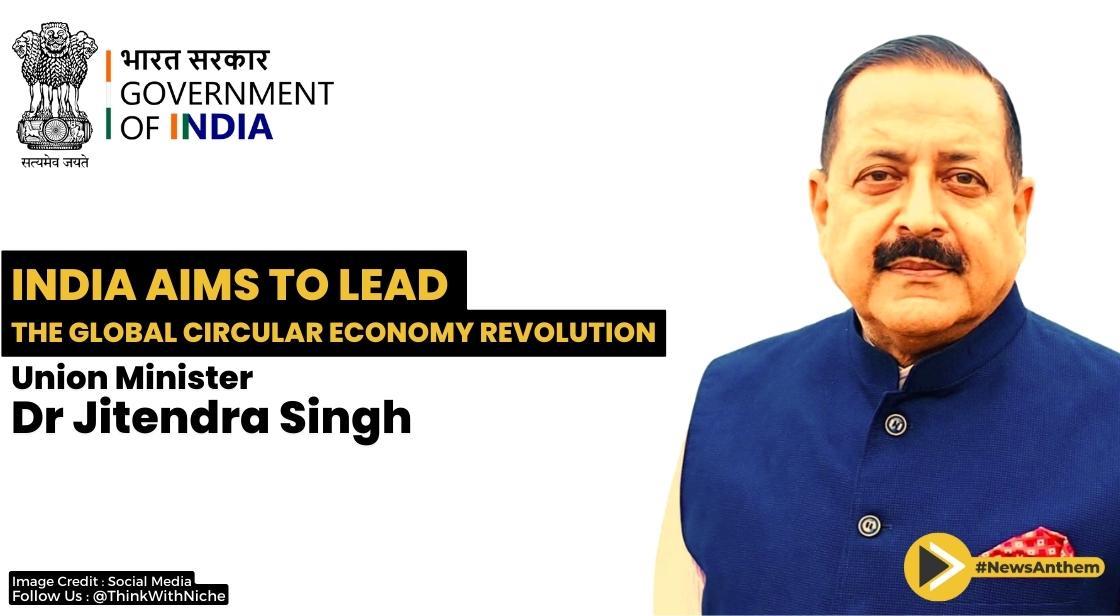India Aims To Lead The Global Circular Economy Revolution-Union Minister Dr. Jitendra Singh

News Synopsis
The concept of turning waste into wealth is central to the "Circular Economy," and Dr. Jitendra Singh's emphasis on this idea reflects a broader trend toward sustainable resource management in India. By viewing waste as a valuable resource, India can create new business opportunities, stimulate economic growth, and promote resource efficiency.
One such example is India's growing waste-to-energy sector, which has the potential to convert municipal solid waste, agricultural waste, and industrial waste into electricity and other forms of energy. By investing in waste-to-energy technologies, India can reduce its reliance on fossil fuels, decrease landfill waste, and produce cleaner energy for its rapidly growing population.
Another area where India can make significant strides in waste management is through the development of innovative recycling and upcycling initiatives. By encouraging the recycling of materials like plastic, glass, metals, and textiles, India can reduce the environmental impact of waste disposal, conserve resources, and create new jobs in the recycling industry.
Enhancing India's Energy Infrastructure through Innovative Technologies
Dr. Jitendra Singh's speech at the CSIR IIP-MSME event highlighted the importance of innovative technologies in transitioning to a more sustainable energy infrastructure. By working together with the MSME sector and industry partners, CSIR-IIP aims to develop and implement cutting-edge solutions that can help India reduce its dependence on fossil fuels and lower its carbon emissions.
One such technology discussed at the event was CSIR-IIP's medical oxygen technology, which has the potential to save lives and reduce the environmental impact of traditional oxygen production methods. In the context of the COVID-19 pandemic, this innovation demonstrates India's commitment to addressing urgent health and environmental challenges through science and technology.
Biogas purification technology is another area where CSIR-IIP is making significant advancements. By improving the efficiency of biogas production and purification, India can reduce its dependence on non-renewable energy sources and harness the power of sustainable, renewable energy to meet its growing energy needs.
Advanced PNG burners and enhanced Gur Bhatti are further examples of the innovative technologies being developed by CSIR-IIP in collaboration with MSME partners. These technologies aim to improve energy efficiency, reduce emissions, and promote sustainable growth in India's energy sector.
India's Growing Role in the Global Circular Economy
ThinkWithNiche News Conclusion, India's commitment to the Circular Economy, as highlighted by Union Minister Dr. Jitendra Singh, signals a shift toward a more sustainable and resource-efficient future. By leveraging innovative technologies and fostering collaboration between CSIR-IIP, the MSME sector, and industry partners, India can drive global change and establish itself as a leader in environmental action. With its growing focus on turning waste into wealth, enhancing energy infrastructure, and embracing sustainable resource management, India is well-positioned to make a significant contribution to the World's Circular Economy in the years to come.
Important News Tags and Headlins for Readers
India's Growing Role in the Global Circular Economy
CSIR-IIP and MSME Collaboration: A Key to Sustainable Growth
Turning Waste into Wealth: A New Perspective on Resource Management
Enhancing India's Energy Infrastructure through Innovative Technologies
You May Like









